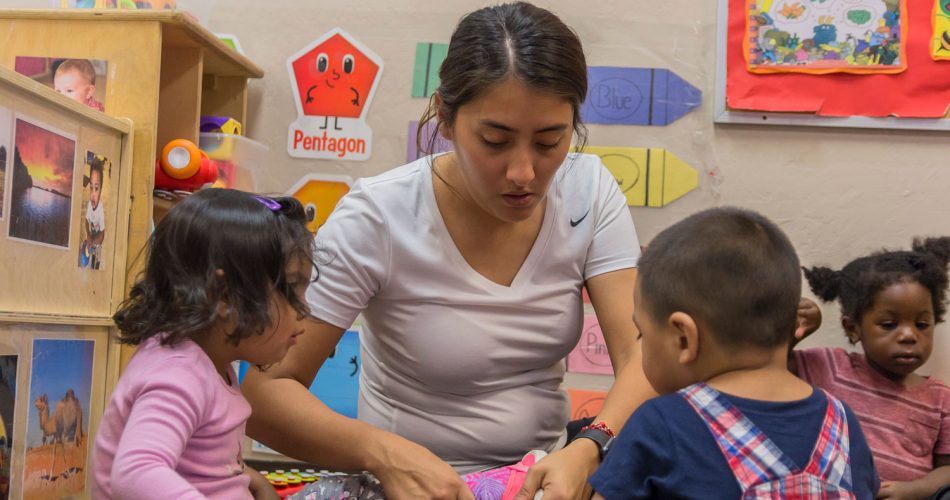A Quality First assessment provides feedback to recognize your program’s unique strengths and to help you set goals for quality improvements using objective, research-based tools. An informal assessment is offered to all regulated early care and education providers in Arizona. Whether your program is enrolled in Quality First, on the waitlist or if you are considering applying, you may request an informal assessment to provide feedback on your program’s daily practices.
The Quality First assessment team recently resumed on-site assessment services through informal assessments, following a pause due to the COVID-19 pandemic. Early education providers across Arizona have participated in informal assessments and have shared how the health and safety precautions put into place by the assessment team have made the process safe and positive for their children and staff.
What is an informal assessment?
An informal assessment provides you with the opportunity to receive objective feedback on your program’s everyday practices through the lens of standardized assessment tools, from skilled and reliable assessment staff. You choose the classroom and timeframe that works best for your program. Following the observation, written feedback will be emailed to you. An informal assessment is provided for professional development purposes only. It will not impact a Quality First star rating.
What are the benefits of an informal assessment?
An informal assessment provides another tool in your quality improvement toolbox. Jennifer Garcia, director of New Leaf’s Phoenix Day, a Quality First participant in the First Things First (FTF) Phoenix South region, said, “We requested an informal assessment to continually grow and improve our practices. Staying engaged in the improvement process keeps us updated on best practices. It is a great opportunity to get support for our work. We receive observations where we are actively focused in our Quality Improvement Plan, which helps us make progress with the help of an outside eye.”
Amanda Ayon, director of Erik Hite Foundation Child Care Center, a Quality First participant in the FTF Pima North region, also has used an informal assessment to help new staff become familiar with the program.
“We have a few staff who are new to the school and who have never worked with Quality First,” said Ayon. “I want them to be able to have the experience of what an assessment would potentially look like when we have an assessment [for star rating].”
“I think the most valuable piece (of an informal assessment) is being able to share the strengths and assets that we already have to encourage our staff to continue to grow and continue to shine.”
— Jennifer Garcia, director of New Leaf’s Phoenix Day
Cold and flu season is in full swing. What health and safety steps do assessors take when visiting programs?
As they would during any time of the year, Quality First assessors are vigilant about reducing the potential spread of germs when visiting early learning programs.
Ayon said the assessors followed strict health practices during a recent visit to her program. “They brought their hand sanitizer and wore masks for the entire visit,” said Ayon. “They picked places in the classroom that were as far from the children and staff as possible. They also allowed me to take their temperatures before entering the building.”
When scheduling your informal assessment, the assessment staff will contact you in advance of their visit to inquire about any potential symptoms of COVID-19 or other health concerns. They will limit their contact to one program and one child care group per day to reduce the risk of spreading germs.
How do I request an informal assessment?
Both Garcia and Ayon described the process of requesting and scheduling an informal assessment as an easy one. Garcia said that “the response came very quickly,” and Ayon said the assessment team “was very flexible with our expectations as visitors in our school.”
Ayon added that although she originally planned to have two classrooms observed, the assessor explained that she could have all classrooms observed, which Ayon choose to do. “We took full advantage of the opportunity,” Ayon said.
Quality First participants may visit the Extranet’s Quality First Resources and select “Quality First Forms” to find the Informal Assessment Request form. Instructions for submittal are included on the form.
Early care and education programs that are not enrolled in Quality First may contact the Quality First Assessment Program Manager Katie Romero to submit a request. Email kromero@swhd.org or call 602.633.8652.
What to do if you’re considering an informal assessment.
Both Ayon and Garcia offer words of advice to those who may be considering an informal assessment for their early learning program.
“The assessors are very professional and willing to work with each program to implement whatever safety measures you feel comfortable with, so they can visit your site,” said Ayon. “Having them come in will provide you and your staff with invaluable information about the environment of your program, so you have a chance to really improve on what you have already been working on so far.”
Garcia said, “I would encourage any program to participate in this opportunity. I would share that the benefits and potential for growth that this opportunity presents can help to streamline the quality improvement goals of your program and the work being done to complete them. This can inform the director, staff and the coaches on next steps. I think the most valuable piece is being able to share the strengths and assets that we already have to encourage our staff to continue to grow and continue to shine.”
At Quality First, we love to hear from you! Share your new and innovative practices so others can be inspired. Send an email to QualityFirst@FirstThingsFirst.org.
